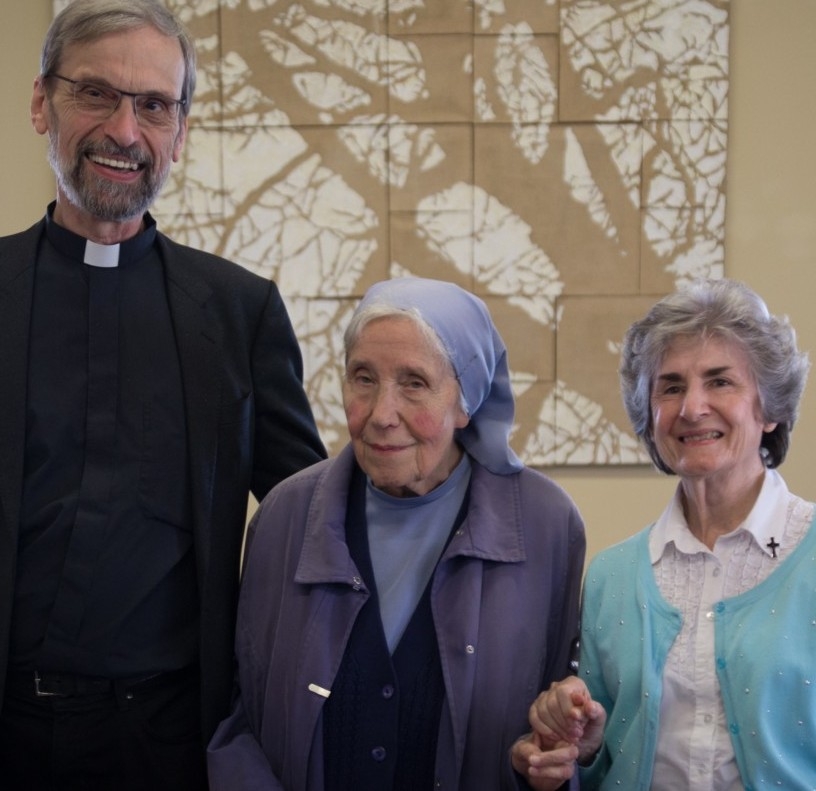Sister Michèle – Person of Reconciliation
Sister Michèle receives the title granted by the Polish Council of Christians and Jews.

Sister Michèle of Communauté de Grandchamp received the honorary title „Person of Reconciliation” awarded to non-Poles by the Polish Council of Christians and Jews.
The honorary title „Person of Reconciliation” is granted by the Polish Council of Christians and Jews to non-Poles working for greater closeness and understanding between Christians and Jews, especially in Poland, in recognition of their contribution to the mutual rapprochement, knowledge and reconciliation of the believers of both religions. This year its recipient is Sister Michèle of Communauté de Grandchamp.
As we read in the laudation: "By awarding this title to Sister Michèle, we want to express our appreciation for her attitude, her commitment and her contact with Poland and, in particular, with the members of our Council. Furthermore, we are pleased to express our gratitude and appreciation to the Grandchamp Community, of which she has been a member since 1960 and in charge of its novitiate for thirty-three years.
The award ceremony took place on August 4, 2019, at the Centre for Dialogue and Prayer in Oświęcim, where two other recipients of the "Person of Reconciliation" title work: Father Manfred Desaelers and Sister Mary O'Sullivan.
A congratulatory letter from Bishop Jerzy Samiec, the leading bishop of the Lutheran Church in Poland, was delivered to Sister Michèle by the head of the Katowice Diocese, bishop Marian Niemiec.
Sister Michèle’s life
"Without transforming suffering into joy, the burden of life would be meaningless. What seems weak in the eyes of this world has been made strong by God.".
Sister Michèle (Irene Müller) was born on 12 October 1934 in Cologne Lindenthal, near the Carmelite monastery where Edith Stein lived at that time. Her father broke down under the pressure of Nazi persecution; his mother, Michèle's grandmother, came from a Jewish family with ties to former and present-day Poland (Gdańsk, Poznań, Olsztyn). Years of war and family experience strongly influenced the girl and her brother, making them both very sensitive and fragile, but at the same time internally strong. The greatest role-model for the children was the mother, who found strength and comfort in the Christian faith, teaching them respect for their fellow human beings. Michèle's education took place mainly in ecclesiastical institutions, including a seminar to prepare for youth work, which was set up within the Berlin Confessing Church (Bekennende Kirche). Students of the seminar studied theology, pedagogy and received a solid foundation for future reconciliation work…. The climate of this university was characterised by openness, broad horizons and tolerance. In addition, Sister Michèle studied at a church school of music. Her professional calling, that is, her work with young people as pastor's assistant, was very enjoyable, although we must be aware that in the Paderborn region, where she lived, the Lutherans were in a definite minority, and the ecumenical efforts were only just beginning.
In 1959, during a retreat led by two brothers from Taizé, Sister Michèle decided to join the female community in Grandchamp. As she herself notes, the words in the leaflet spoke to her: "Grandchamp. An ecumenical call to prayer and reconciliation between Christians, nations, religions and cultures in unity with and respect for creation. The spirituality of "prayer and reconciliation" has been decisive for her journey, in communion with the Jewish sisters and brothers, through reading, lectures and meetings. Michèle's intentions came true a year later. On the Thursday before the Pentecost, the first German woman, Irene, joined Granchamp. The process of reconciliation with her homeland and herself began. Sister Minke, a Dutch-born abbess of the community from 1970-1999, was a great help in this regard. The meek Irene turned into a more courageous Michèle, as she says. Some stages of her communal and monastic calling are particularly worth reminding: She worked at the Sonnehof (a guest house in German-speaking Switzerland), in Lebanon, in France (at a production line in a biscuit factory), and stayed in Israel many times. For thirty-three years Sr. Michèle was in charge of the novitiate of the community, accompanying the young sisters in their calling. In 2001, she had a chance to visit Poland. Michèle travelled in the footsteps of her past (especially her Jewish roots). Much more happened, however, because it was also here that her "work" on reconciliation began – in a small, modest dimension, in which, as she says, many had already walked before her. She regularly comes to Auschwitz (retreats in 2015, 2017, 2019). She participated in the ecumenical conferences of the Christophorus network, which brings together religious communities from Poland and Germany (previously held in Laski). Since 2001, Sister Michèle has also been involved in "contemplative retreats," an essential part of which is reconciliation and transformation.
Read more about Sister Michèle in Polish on the website of Więź